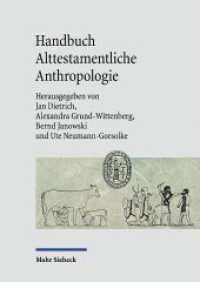Full Description
Human and ecological systems face substantial risks, and the ways individuals and communities adapt, change or otherwise transform are being increasingly highlighted as routes to address long-standing system-level problems. Central to this are the ways in which mediated communication may foster and support community resilience and collective efficacy.
Communicating Resiliency and Efficacy in a Digital Age: Mediated Communities takes an interdisciplinary look at the roles and processes associated with mediated communication in helping to foment community resiliency. The chapters describe the nexus of communication, media, health, and the environment and identifies leverage points to engage scholars across disciplines in the social sciences and humanities,
Through a culture-centric lens, this edited collection looks at how the concepts of community resilience and collective efficacy have been applied to work across academic disciplines, and how new understandings and applications may result.
Contents
Introduction: Resiliency, Efficacy and Community in a Digital Age; Lola Xie, Juliet Pinto, and Stephen Mainzer
Section 1. Coping with Crisis and Disaster
Chapter 1. Collective Efficacy for Public Health in an Age of Climate Change: A Review and Future Research Agenda; Cassandra L.C. Troy and Kathryn Thier
Chapter 2. Fostering Community Resilience through Hybrid Communicative Practices: The Role of Digital Media in Complex Disaster Scenarios; Jiayu Sun
Chapter 3. Seek potential in engagement and service integration to foster community resilience for climate anxiety: A scoping review; Xiaoxu Ding
Section 2. Tools for Fostering Resiliency
Chapter 4. Imagined landscapes as spaces of negotiation and co-creation; Peter Stempel, Ellie Nasr-Azadani, and Annette Grilli
Chapter 5. Bridging the (Eco-Literacy) Gap: Using Community Engagement to Build Collective Action; Lisa DuRussel and Nana Temple
Chapter 6. Toward Just Climate Futures: Examining Community Dimensions of How Researchers and Practitioners Collaborate with Indigenous Groups; Olivia Boon and Stephen Mainzer
Section 3. Risks and Opportunities in a Networked World
Chapter 7. Correcting Climate Change Misinformation to Encourage Sustainable Consumption Behaviors: The Mediating Role of Perceived Scientific Consensus; Bingbing Zhang, Juliet Pinto, Paola Prado, and Rachel Patterson
Chapter 8. Agency, Advertising and its Interdependence with the Roots of Climate Change; David J. Park
Chapter 9. Digital ephemerality in wartime: Reflections on archiving, text encoding, and teaching digital humanities in the 2020s; Elisa Beshero-Bondar
Conclusion: Mediated Communities; Juliet Pinto, Stephen Mainzer, and Lola Xie


![Cooking for Good Times : Super Delicious, Super Simple [A Cookbook]](../images/goods/ar/work/imgdatag/03995/0399578587.JPG)





